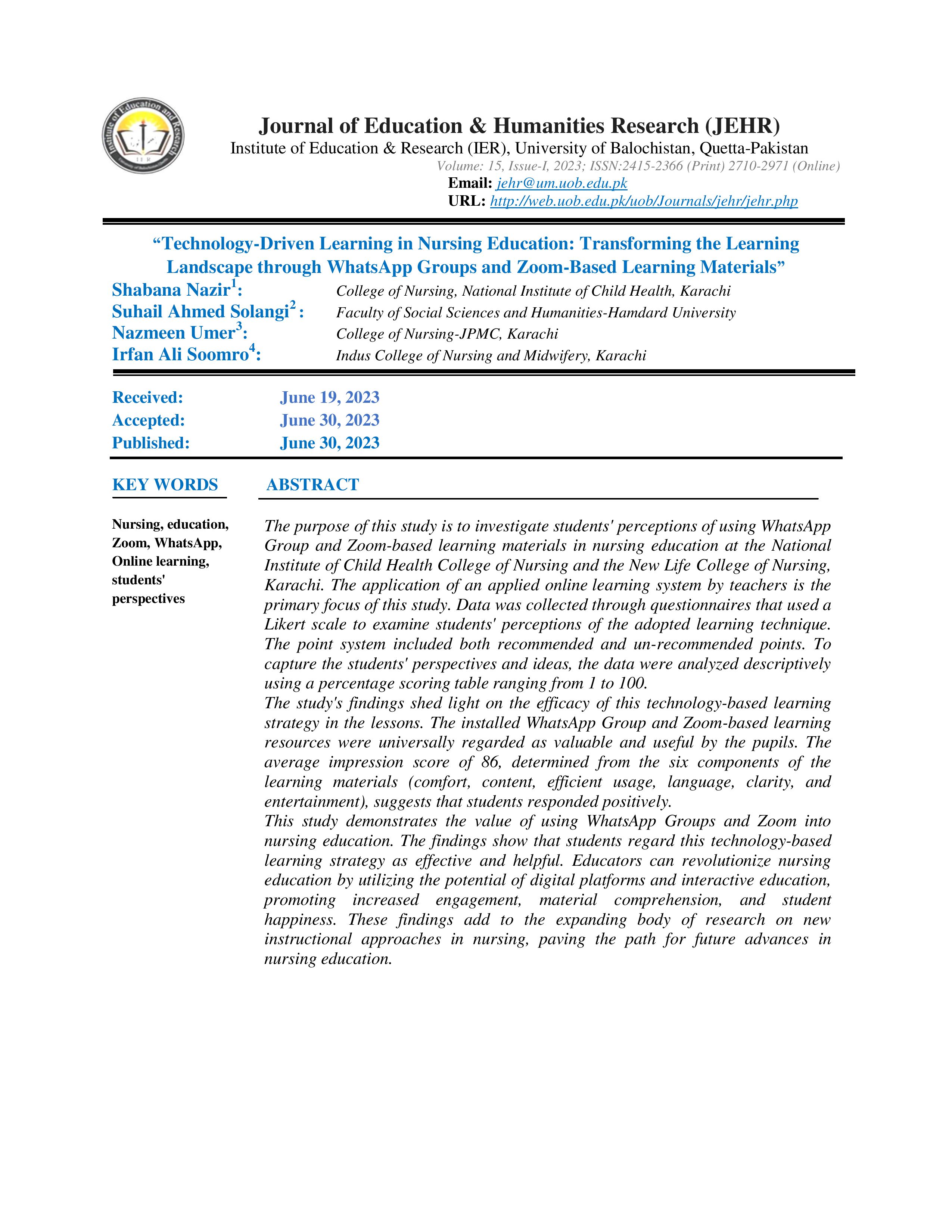Technology-Driven Learning in Nursing Education: Transforming the Learning Landscape through WhatsApp Groups and Zoom-Based Learning Materials
Keywords:
Nursing, education, Zoom, WhatsApps, Online learning, students' perspectivesAbstract
The purpose of this study is to investigate students' perceptions of using WhatsApp Group and Zoom-based learning materials in nursing education at the National Institute of Child Health College of Nursing and the New Life College of Nursing, Karachi. The application of an applied online learning system by teachers is the primary focus of this study. Data was collected through questionnaires that used a Likert scale to examine students' perceptions of the adopted learning technique. The point system included both recommended and un-recommended points. To capture the students' perspectives and ideas, the data were analyzed descriptively using a percentage scoring table ranging from 1 to 100.
The study's findings shed light on the efficacy of this technology-based learning strategy in the lessons. The installed WhatsApp Group and Zoom-based learning resources were universally regarded as valuable and useful by the pupils. The average impression score of 86, determined from the six components of the learning materials (comfort, content, efficient usage, language, clarity, and entertainment), suggests that students responded positively.
This study demonstrates the value of using WhatsApp Groups and Zoom into nursing education. The findings show that students regard this technology-based learning strategy as effective and helpful. Educators can revolutionize nursing education by utilizing the potential of digital platforms and interactive education, promoting increased engagement, material comprehension, and student happiness. These findings add to the expanding body of research on new instructional approaches in nursing, paving the path for future advances in nursing education.
References
Allen, M. P. (2019). The integration of technology in nursing curricula: Supporting faculty via the technology fellows program. Journal of Nursing Education, 58(1), 59-61.
Alnujaidi, S. (2017). Social Network Sites Effectiveness from EFL Students Viewpoints. English Language Teaching.
Ahmed, A. K. (2018). Use of multimedia technology in nursing education: A literature review. Journal of Education and Practice, 9(7), 89-94.
Caton, T., & Greenstreet, W. (2018). The role of social media in developing nursing students' professional identity. British Journal of Nursing, 27(7), 378-383.
Curran, V., Fleet, L., Kirby, F., Lazenby, K., & Lawrance, R. (2019). A review of digital, social, and mobile technologies in health professional education. Journal of Continuing Education in the Health Professions, 39(2), 87-96.
Hastie, C. R., Henriksen, L. E., Doherty, I., & Clark, S. (2020). Social media in nursing and midwifery education: A mixed-methods study exploring the impact on learning and professional identity development. Journal of Advanced Nursing, 76(12), 3264-3274.
Gause, G., Mokgaola, I. O., & Rakhudu, M. A. (2022). Technology usage for teaching and learning in nursing education: An integrative review. Curationis. 45(1)
Ghazali, A. (2010). Language Skills Learning with Communicative-Interactive Approach. Bandung: Refika Aditama
Koc, D. (2016). Students’ perceptions of blog use in an undergraduate linguistics course. Journal of Language and Linguistic Studies.
Tong, A. (2020). The role of social media in nursing education: Integrative review. JMIR Nursing, 3(1), e20134




